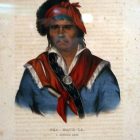The post Battle Of Hobdy’s Bridge: Last Significant Indian Battle In Alabama appeared first on Digital Alabama.
]]>On March 24th, 1837, the last significant Indian battle in Alabama was fought between 900 warriors of the Creek Nation and white settlers. Led by General William Wellborn, a large force of volunteers and militia left Eufaula, Alabama (then called Irwinton) to find and capture or kill the Creek Indians who had fled into the swamps following an attack on the camp where they were being held prior to their removal to present-day Oklahoma. Reaching Hobdy’s Bridge, then a long wooden span and causeway, Wellborn learned that the main party of Creeks were camped about one mile north of the bridge. Sending part of his force up the east or Barbour County side of the Pea River under Captain Harrell, he moved up the west or Pike County side with his primary command. As he neared the site of the camp, gunfire erupted in the swamp. Wellborn defeated the refugee Creeks but had failed to surround and capture them. They fled south down the Pea River to its confluence with the Choctawhatchee and continued across the line into Florida. Several hundred men, women and children fled into the Pea River swamps and began and desperate attempt to make their way to Florida. Outraged over the attacks, they were determined to fight their way through if that’s what it took. Furious at their treatment, they continued to battle the whites for years to come.

Neamathla, who has been one of the most distinguished of the Seminoles, and was at one time their head man, or principal chief, was by birth a Creek.
Led by Neamathla, Jim Henry (later called James McHenry) and other key leaders of the Lower Creeks, warriors had fought against white forces along the Chattahoochee River in Georgia and Alabama. Their goal was to prevent their forced removal to the west, but despite early successes, their war ended in failure. The important leaders of the resistance were seized and thousands of men, women and children taken prisoner and forced into what were essentially concentration camps.
Named for an early settler, Hobdy’s Bridge spanned the river between Pike County and Barbour County about seven miles west of the town of Louisville, Alabama. A modern concrete bridge now carries traffic on State Road 130 across the river, but in 1837 the bridge was a long wooden span and causeway. Then, as now, the bridge was surrounded by vast floodplain swamps. Hobdy’s Bridge is located on Alabama State Highway 130, about seven miles west of the town of Louisville, Alabama. A modern concrete bridge crosses the Pea River at the site and a marker commemorating the battle can be seen on the western or Pike County side.
The post Battle Of Hobdy’s Bridge: Last Significant Indian Battle In Alabama appeared first on Digital Alabama.
]]>